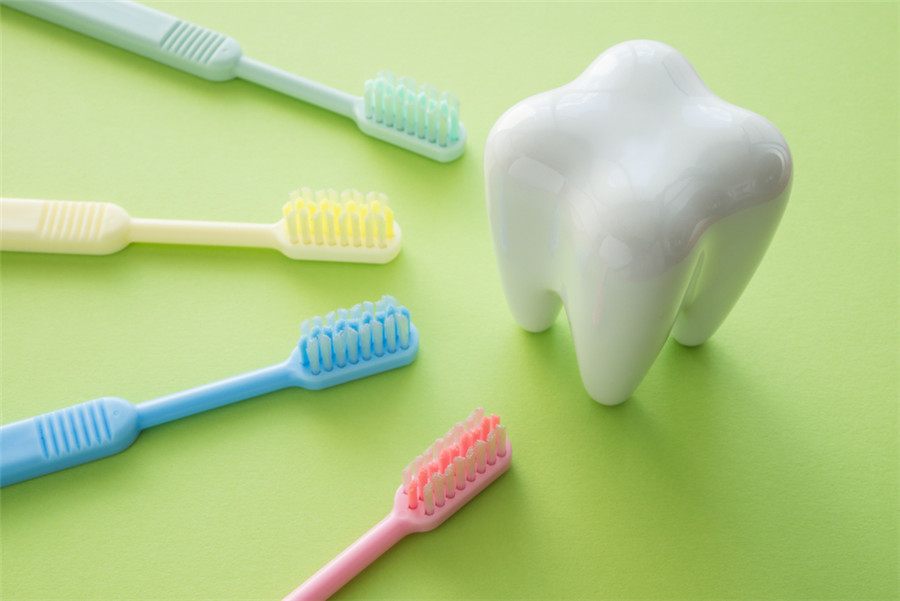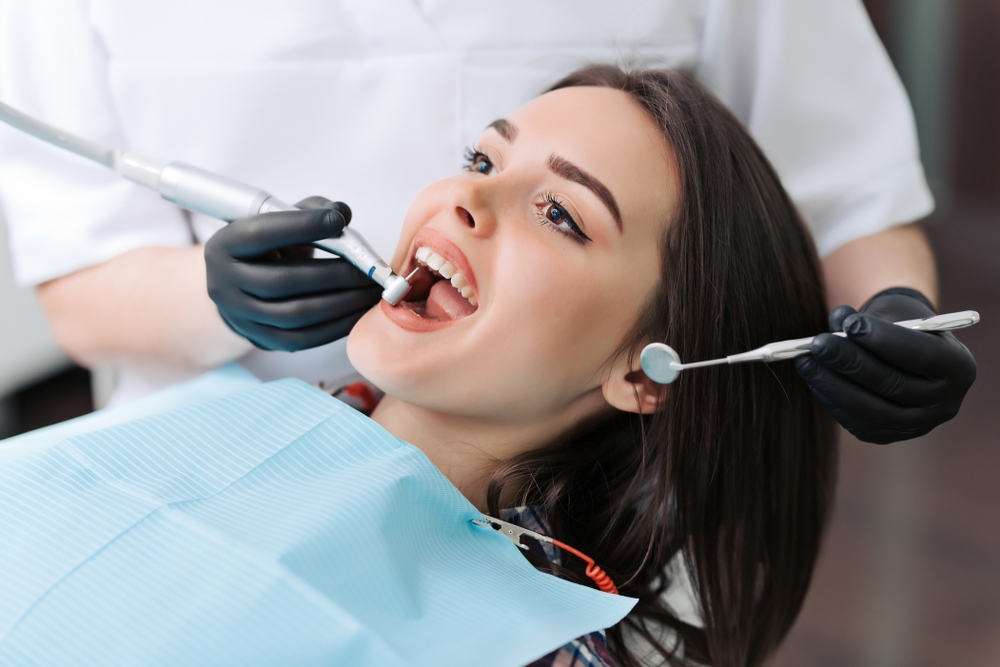
As an stomatologist, I often earnestly advise my relatives and friends to clean their teeth regularly.
The so-called “tooth cleaning” is actually what people usually call “tooth cleaning”. However, every time we encounter some misunderstandings, we can see that everyone has a very big prejudice against tooth cleaning.
In fact, tooth cleaning is very necessary for the vast majority of people, but there are too many wrong understandings.
1. Why do you want to clean your teeth?
First of all, tooth cleaning is a deep cleaning of the oral cavity.
Standardized brushing and gargling are also difficult to completely remove food residues and soft dirt. Inorganic salts in the oral cavity deposit in dental plaque and gradually form dental calculus.
Dental calculus deposits in the neck of the tooth and is easy to absorb and accumulate bacteria. If gingival tissue is stimulated for a long time, it will cause edema and congestion of the gingiva, then erosion and gingival hemorrhage. Continued development will lead to bone destruction of alveolar bone wrapping the root of the tooth and eventually lead to loosening and falling off of the tooth.
However, tooth cleaning means that stomatologists use tooth cleaning instruments to remove dental plaque and calculus deposited on the tooth surface and under the gums, so as to prevent or reduce gingival inflammation as much as possible.
At the same time, the process of tooth cleaning is also a comprehensive oral examination, which is easy to find small and imperceptible dental diseases, such as relatively hidden dental caries, thus achieving the purpose of early detection and treatment.
In addition, tooth cleaning is also the preparation before other treatments in the oral cavity, such as tumors in the oral cavity, jaw resection, dental implant surgery, etc., to ensure the cleaning around the operation area and eliminate the hidden dangers of infection. Therefore, tooth cleaning and tooth whitening are two different things!
2. How is tooth cleaning done? Did you hurt your teeth?
Tooth cleaning is often commonly known as [tooth cleaning], so many people think that its principle is to use acidic substances to corrode the teeth, thus [washing] away the dirty things on the surface, so they worry that tooth cleaning will damage the enamel on the tooth surface. In fact, this is a misunderstanding.
Common tooth cleaning methods are divided into ultrasonic cleaning and hand instrument cleaning.
At present, ultrasonic scaling is mostly used, i.e. The dental calculus on the tooth surface is smashed through the high-frequency oscillation of ultrasonic wave, and then the crushed stones are washed down and sucked into the aspirator through the water mist generated by the scaling machine. The process is hygienic and safe, and the normal operation does not damage the teeth.
For some patients with a large amount of pigment on the tooth surface, sandblasting treatment is also needed, i.e. Special salt particles and high-pressure water are used to clean the teeth, which can achieve obvious effect of removing pigment. In short, the teeth themselves and the dirt on their surface are not a texture or a hardness level at all. Regular tooth cleaning will not harm the teeth themselves.
3. Do you still need to clean your teeth after brushing your teeth carefully every day?
Yes. Various methods of maintaining oral cleaning have different functions and cannot replace each other.
Brushing teeth, dental floss sticks, mouthwash, floss, etc. can remove most food residues and soft dirt in the oral cavity, but have limited effect on irregular tooth surfaces and under gums.
However, dental plaque is rapidly generated. If it is not completely removed in time, inorganic salts in saliva and gingival crevicular fluid deposit in it and gradually form stones. Once dental stones are formed, they can only be removed by cleaning teeth.
The “Guidelines for Oral Health of Chinese Residents” issued by China’s Ministry of Health advocates that ordinary people clean their teeth once a year, while people with smoking habits and periodontal diseases need to increase the frequency as appropriate.
4. Can cleaning teeth [whiten] teeth?
Tooth cleaning can remove stones, pigments, etc. attached to the tooth surface, thus exposing the original color of the tooth, and the original color of each person’s tooth is different, which is determined by the enamel on the surface of the tooth.
Enamel is a highly mineralized tissue. The more complete its mineralization is and the higher its transparency is, the more light yellow of the inner dentin will be exposed, and the more yellow the tooth color will be.
Of course, for those who have never cleaned their teeth or seldom cleaned their teeth, once the smoke scale and pigment on the tooth surface are removed and the true colors of the teeth are exposed, the effect of obvious smoothing of the teeth will be immediately produced.
Therefore, tooth cleaning cannot change the color of the teeth themselves, but the brand-new brightness of the tooth surface can really make the teeth look much better.
5. Will tooth cleaning cause tooth loosening?
No.
Most people’s tooth cleaning will reflect the different feeling of the tongue touching the teeth, and even the gap between the teeth near the gums can be observed. This is because the dental calculus filled between the teeth is removed by tooth cleaning, which does not mean that your teeth have been damaged by tooth cleaning.
On the other hand, if dental calculus that accumulates bacteria and releases toxins is allowed to exist in the oral cavity, it will cause continuous damage to periodontal tissues that wrap and support teeth, eventually leading to tooth loosening or even falling off.

6. Does tooth cleaning hurt?
Pain caused by doctor’s operation is relatively rare, and the more common discomfort should be called [sensitivity].
Because of the weak awareness of health care, most people’s oral condition is not very good when cleaning their teeth for the first time. Once the dental calculus formed over the years is removed, the neck and even root of the teeth, which are more sensitive to pain, will have obvious discomfort when exposed to the oral cavity, which is described by a popular word as “sour and cool”.
The use of desensitization polishing paste for tooth surface polishing in regular tooth cleaning operations can effectively relieve sensitive symptoms.
Within one to two weeks after tooth cleaning, attention should also be paid to avoid cold and hot stimulation. Using special desensitization toothpaste when brushing teeth every day will obviously improve this [acid] feeling.
Generally speaking, the discomfort of tooth cleaning is temporary and tolerable to most people.
7. Is cheap tooth cleaning in small clinics reliable?
Tooth cleaning is actually a very professional and meticulous medical operation, It is not only a treatment, but also a comprehensive [physical examination] of teeth. It requires doctors to master the cleaning technology skillfully and at the same time have rich professional experience, be able to accurately judge whether teeth have caries, the degree of gingival inflammation, etc., and finally give you professional guidance on your oral problems.
In addition, tooth cleaning requires high disinfection requirements for instruments and the environment, otherwise there is a risk of infection. Therefore, large hospitals and regular clinics are the first choice for tooth cleaning. Although tooth cleaning seems to be a [small dental operation], it is still not easy to choose too cheap and irregular clinics.
Whether young or old, having a good tooth is the foundation of health. I hope you can solve misunderstanding and eliminate prejudice after reading this article. Care for teeth starts from facing up to cleaning teeth.
